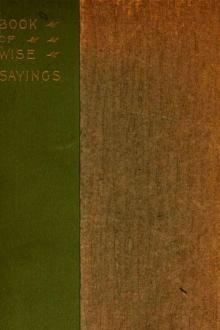Dreams, Walking Thoughts, and Incidents, William Thomas Beckford [books for men to read txt] 📗

- Author: William Thomas Beckford
Book online «Dreams, Walking Thoughts, and Incidents, William Thomas Beckford [books for men to read txt] 📗». Author William Thomas Beckford
After crossing a broad, noble river, edged on one side by beds of osiers beautifully green, and on the other by gates and turrets preposterously ugly, we came through several streets of lofty houses to our inn. Its situation in the "Place de Mer," a vast open space surrounded by buildings above buildings, and roof above roof, has something striking and singular. A tall gilt crucifix of bronze, sculptured by some famous artist, adds to its splendour; and the tops of some tufted trees, seen above a line of magnificent hotels, have no bad effect in the perspective.
It was almost dusk when we arrived; and as I am very partial to new objects discovered by this dubious visionary light, I went immediately a-rambling. Not a sound disturbed my meditations; there were no groups of squabbling children or talkative old women. The whole town seemed retired into their inmost chambers; and I kept winding and turning about, from street to street, and from alley to alley, without meeting a single inhabitant. Now and then, indeed, one or two women in long cloaks and mantles glided about at a distance; but their dress was so shroud-like, and their whole appearance so ghostly, that I was more than half afraid to accost them. As the night approached, the ranges of buildings grew more and more dim, and the silence which reigned amongst them more awful. The canals, which in some places intersect the streets, were likewise in perfect solitude, and there was just light sufficient for me to observe on the still waters the reflection of the structures above them. Except two or three tapers glimmering through the casements, no one circumstance indicated human existence. I might, without being thought very romantic, have imagined myself in the city of petrified people, which Arabian fabulists are so fond of describing. Were any one to ask my advice upon the subject of retirement, I should tell him,--By all means repair to Antwerp. No village amongst the Alps, or hermitage upon Mount Lebanon, is less disturbed: you may pass your days in this great city without being the least conscious of its sixty thousand inhabitants, unless you visit the churches. There, indeed, are to be heard a few devout whispers, and sometimes, to be sure, the bells make a little chiming; but walk about, as I do, in the twilights of midsummer, and be assured your ears will be free from all molestation.
You can have no idea how many strange, amusing fancies played around me whilst I wandered along; nor how delighted I was with the novelty of my situation. But a few days ago, thought I within myself, I was in the midst of all the tumult and uproar of London: now, as if by some magic influence, I am transported to a city equally remarkable for streets and edifices, but whose inhabitants seem cast into a profound repose. What a pity that we cannot borrow some small share of this soporific disposition! It would temper that restless spirit which throws us sometimes into such dreadful convulsions. However, let us not be too precipitate in desiring so dead a calm; the time may arrive when, like Antwerp, we may sink into the arms of forgetfulness; when a fine verdure may carpet our Exchange, and passengers traverse the Strand, without any danger of being smothered in crowds, or lost in the confusion of carriages.
Reflecting, in this manner, upon the silence of the place, contrasted with the important bustle which formerly rendered it so famous, I insensibly drew near to the cathedral, and found myself, before I was aware, under its stupendous tower. It is difficult to conceive an object more solemn or imposing than this edifice at the hour I first beheld it. Dark shades hindered my examining the lower galleries or windows; their elaborate carved work was invisible; nothing but huge masses of building met my sight, and the tower, shooting up four hundred and sixty-six feet into the air, received an additional importance from the gloom which prevailed below. The sky being perfectly clear, several stars twinkled through the mosaic of the spire, and added not a little to its enchanted effect. I longed to ascend it that instant, to stretch myself out upon its very summit, and calculate from so sublime an elevation the influence of the planets.
Whilst I was indulging my astrological reveries, a ponderous bell struck ten, and such a peal of chimes succeeded, as shook the whole edifice, notwithstanding its bulk, and drove me away in a hurry. No mob obstructed my passage, and I ran through a succession of streets, free and unmolested, as if I had been skimming along over the downs of Wiltshire. My servants conversing before the hotel were the only sounds which the great "Place de Mer" echoed.
This universal stillness was the more pleasing, when I looked back upon those scenes of horror and outcry which filled London but a week or two ago, when danger was not confined to night only, and the environs of the capital, but haunted our streets at midday. Here, I could wander over an entire city; stray by the port, and venture through the most obscure alleys, without a single apprehension; without beholding a sky red and portentous with the light of fires, or hearing the confused and terrifying murmurs of shouts and groans, mingled with the reports of artillery. I can assure you, I think myself very fortunate to have escaped the possibility of another such week of desolation, and to be peaceably roosted at Antwerp. Were I not still fatigued with my heavy progress through sands and quagmires, I should descant a little longer upon the blessings of so quiet a metropolis, but it is growing late, and I must retire to enjoy it.
LETTER III
ANTWERP, June 23rd.
My windows look full upon the Place de Mer, and the sun, beaming through their white curtains, awoke me from a dream of Arabian happiness. Imagination had procured herself a tent on the mountains of Sanaa, covered with coffee-trees in bloom. She was presenting me the essence of their flowers, and was just telling me that you possessed a pavilion on a neighbouring hill, when the sunshine dispelled the vision; and opening my eyes, I found myself pent in by Flemish spires and buildings: no hills, no verdure, no aromatic breezes, no hope of being in your vicinity: all were vanished with the shadows of fancy, and I was left alone to deplore your absence. But I think it rather selfish to wish you here, for what pleasure could pacing from one dull church to another, afford a person of your turn? I don't believe you would catch a taste for blubbering Magdalens and coarse Madonnas, by lolling in Rubens' chair; nor do I believe a view of the Ostades and Snyders, so liberally scattered in every collection, would greatly improve your pencil.
After breakfast this morning I began my pilgrimage to all those illustrious cabinets. First, I went to Monsieur Van Lencren's, who possesses a suite of apartments, lined, from the base to the cornice, with the rarest productions of the Flemish school. Heavens forbid I should enter into a detail of their niceties! I might as well count the dew-drops upon any of Van Huysem's flower-pieces, or the pimples on their possessor's countenance; a very good sort of man, indeed; but from whom I was not at all sorry to be delivered.
My joy was, however, of short duration, as a few minutes brought me into the courtyard of the Chanoin Knyfe's habitation; a snug abode, well furnished with easy chairs and orthodox couches. After viewing the rooms on the first floor, we mounted a gentle staircase, and entered an ante-chamber, which those who delight in the imitations of art rather than of nature, in the likenesses of joint stools and the portraits of tankards, would esteem most capitally adorned: but it must be confessed, that, amongst these uninteresting performances, are dispersed a few striking Berghems and agreeable Polemburgs. In the gallery adjoining, two or three Rosa de Tivolis merit observation; and a large Teniers, representing a St. Anthony surrounded by a malicious fry of imps and leering devilesses, is well calculated to display the whimsical buffoonery of a Dutch imagination.
I was observing this strange medley, when the Canon made his appearance; and a most prepossessing figure he has, according to Flemish ideas. In my humble opinion his Reverence looked a little muddled or so; and, to be sure, the description I afterwards heard of his style of living, favours not a little my surmises. This worthy dignitary, what with his private fortune and the good things of the church, enjoys a revenue of about five thousand pounds sterling, which he contrives to get rid of in the joys of the table and the encouragement of the pencil.
His servants, perhaps, assist not a little in the expenditure of so comfortable an income; the Canon being upon a very social footing with them all. At four o'clock in the afternoon, a select party attend him in his coach to an alehouse about a league from the city; where a table, well spread with jugs of beer and handsome cheeses, waits their arrival. After enjoying this rural fare, the same equipage conducts them back again, by all accounts, much faster than they came; which may well be conceived, as the coachman is one of the brightest wits of the entertainment.
My compliments, alas! were not much relished, you may suppose, by this jovial personage. I said a few favourable words of Polemburg, and offered up a small tribute of praise to the memory of Berghem; but, as I could not prevail upon Mynheer Knyfe to expand, I made one of my best bows, and left him to the enjoyment of his domestic felicity.
In my way home, I looked into another cabinet, the greatest ornament of which was a most sublime thistle by Snyders, of the heroic size, and so faithfully imitated that I dare say no ass could see it unmoved. At length, it was lawful to return home; and as I positively refused visiting any more cabinets in the afternoon, I sent for a harpsichord of Rucker, and played myself quite out of the Netherlands.
It was late before I finished my musical excursion, and I took advantage of this dusky moment to revisit the cathedral. A flight of starlings was fluttering about one of the pinnacles of the tower; their faint chirpings were the only sounds that broke the stillness of the air. Not a human form appeared at any of the windows around; no footsteps were audible in the opening before the grand entrance; and, during the half hour I spent in walking to and fro beneath the spire, one solitary Franciscan was the only creature that accosted me. From him I learnt that a grand service was to be performed next day in honour of St. John the Baptist, and the best music in Flanders would be called forth on the occasion. As I had seen cabinets enough to form some slight judgment of Flemish painting, I determined to stay one day longer at Antwerp to hear a little how its inhabitants were disposed to harmony.
Having taken this resolution, I formed an acquaintance with Mynheer Vander Bosch, the first organist of the place, who very kindly permitted me





Comments (0)